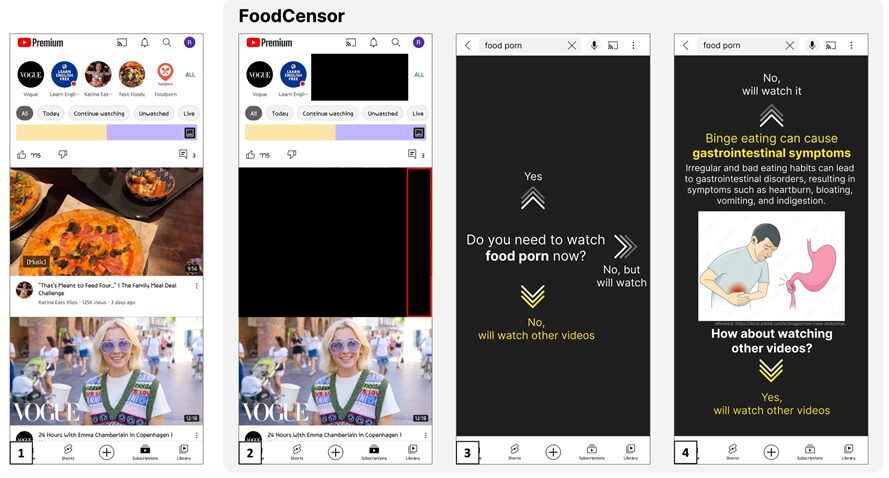[Professor Sung-Ju Lee Laboratory, “Healthy diet in digital buffet” receives ACM CHI Best Paper Honorable Mention Award for preventing negative effects of Mukbang and cooking shows on patients with eating disorders]

<(from left) Professor Sung-Ju Lee, ph.d. candidate Ryuhaerang Choi, MS candidate Subin Park, Ph.d. candidate Sujin Han>
Professor Sung-Ju Lee’s research team has presented their paper titled “FoodCensor: Promoting Mindful Digital Food Content Consumption for People with Eating Disorders” at the international conference CHI in the field of Human-Computer Interaction. The paper introduces a real-time intervention system designed to prevent the detrimental effects of digital food content consumption among individuals with eating disorders. Their work was awarded the Honorable Mention for Best Paper at the conference.
*Research Demo Video: https://drive.google.com/file/d/103OG9qHpjbfIMhB4tP4I4ESyPlP1pAAD/view
According to recent studies, various food-related contents have been found to be addictive, with visually appealing presentations, immersive experiences, and auditory stimuli contributing to cravings and reinforcing unhealthy eating habits beyond addiction. While for some, eating is a natural act, individuals with eating disorders struggle daily against the allure of unhealthy eating habits. Particularly sensitive and vulnerable to addictive food-related content, these individuals may see their disorder symptoms worsen due to such content.
In response to these concerns, Professor Sung-Ju Lee and his research team have developed FoodCensor, a system to mitigate the detrimental impacts of digital food content in YouTube on people with eating disorders on mobile and personal computers. Drawing inspiration from the Dual Systems Theory in psychology, this system is designed to tear off the potential connection between digital food content and eating disorders. The theory posits two decision-making systems: System 1, which operates fast and automatically, and System 2, which engages in slower, more thoughtful judgments.

<Figure 1. Example of real-time food content censorship and intervention in Youtube mobile application of the system>

<Figure 2. The system ① reduces the influence of stimuli by screening digital food content, ② encourages users to transition from system 1 automatic responses to system 2 conscious evaluations by revealing screened content through immediate questioning when users desire to view it, and ③ promotes conscious and healthy content consumption by providing negative impacts of eating disorder behaviors along with questions to increase the expected value of control>
Based on this theory, the system aims to enable users to make more conscious evaluations and decisions when consuming food content on social media. Visual and auditory stimuli associated with digital food content may trigger automatic responses (System 1; e.g., reflexively watching content). However, the system blocks these automatic responses by hiding food content in real-time and muting it, activating System 2 by providing users with reflective prompts to encourage conscious content selection and consumption.
The research team conducted a three-week user study involving 22 participants with eating disorders to evaluate the system. The experimental group showed a significant reduction in exposure to food content on YouTube, affecting the platform’s content recommendation algorithm. Experimental group participants acknowledged the system’s role in inhibiting automatic reactions and promoting System 2 control. User feedback indicated that the system alleviated food-related obsessions in daily life and improved overall quality of life.
Building on these findings, the research team proposed adaptive intervention design directions to support healthy digital content consumption and user-centric content management methods that promote intentional behavior changes beyond content censorship.
Lead author Ryuhaerang Choi (PhD Candidate) and co-authors Subin Park (MS Candidate), Sujin Han (PhD Candidate), and Professor Sung-Ju Lee participated in this study. The research was presented at the ACM Conference on Human Factors in Computing Systems (CHI) in Hawaii in May. (Paper Title: FoodCensor: Promoting Mindful Digital Food Content Consumption for People with Eating Disorders) and has won the Best Paper Honorable Mention Award.
This technology could be applied to contents beyond food, such as violence and explicit contents, and thus, could be widely deployed.
This work was supported in part by the Institute of Information & communications Technology Planning & Evaluation (IITP) grant funded by the Korean government (MSIT) (No. 2022-0-00064, Development of Human Digital Twin Technologies for Prediction and Management of Emotion Workers’ Mental Health Risks).